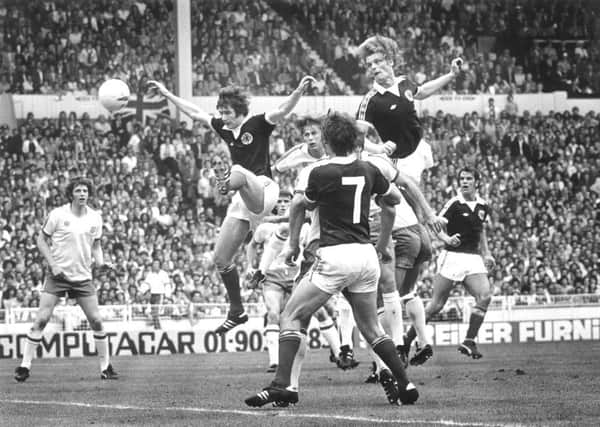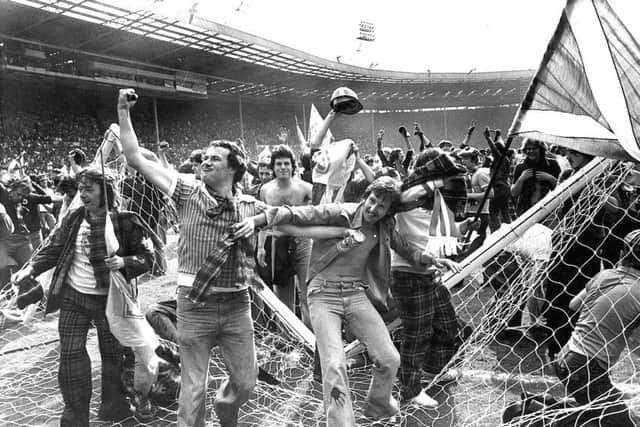Wembley '77 marked a zenith for Scots international football


During my stint as The Scotsman’s football correspondent I can’t recall the national team producing a more compelling performance than the 3-1 win over Spain at Hampden in 1984.
However, there was a giddy mood of exhilaration attached to the 2-1 victory at Wembley in the early summer of 1977 which was unmatched in my experience. Whatever pitfalls were to lie around the corner, Scotland’s star was in the ascendancy that June.
Advertisement
Hide AdAdvertisement
Hide AdUnder the direction of Ally MacLeod, who, like Dickens’ eternal optimist, Mr Micawber in David Copperfield, had cheered up the supporters of Aberdeen and Ayr United prior to becoming Scotland manager, the Tartan Army flocked to Wembley feeling grand about themselves.


A goalless draw with Wales in Wrexham followed by the 3-0 scalping of Northern Ireland at Hampden meant Scotland arrived in north London with an opportunity to defeat the Auld Enemy and become kings of British football.
Readers too young to recall the delights of the biennial trip to Wembley, may find it difficult to appreciate the sense of dread which usually accompanied the high expectations attached to watching Scotland play England. On that summer’s afternoon, as the Saltires and the Lion Rampants swayed in mighty unison, any anxieties about the outcome were tranquilised by the best drug of all. Scotland enjoyed the remedy against England of playing with head and heart.
It was one of those noteworthy occasions in the ancient rivalry between the nations when the Scots fielded more fine players. Gordon McQueen and Danny McGrain were world-class defenders. The midfield of Don Masson, Bruce Rioch and Asa Hartford was fluent. Willie Johnston supplied the ingenuity of a corkscrew winger on the left flank and the strike partnership of Kenny Dalglish and Joe Jordan was among the most effective pairings.
It was Hartford’s free-kick which set up McQueen for the opening goal. Denis Straughan was The Scotsman photographer at the match. His monochrome image of the centre-half’s towering header is one of the most iconic sports pictures to grace these pages. The sharpness and the detail in the original reproduction captures the distracting involvement of Rioch and Dalglish, the leaden-footed reaction of the English defensive cover and McQueen’s majestic leap, his blonde hair tossed high by the breeze.


It was the inventive Hartford who then struck the defence-splitting pass in the second half which enabled Johnston to swing over the cross for Dalglish to scramble home the second goal.
With McGrain rampant at right-back, Scotland outplayed England for most of that afternoon. Only the home side’s soft, late penalty converted by Mick Channon lent the scoreline a competitive gloss.
Although no one could have guessed it at the time, the celebrations marked a zenith for Scottish international football which would not be eclipsed over the coming decades.
Advertisement
Hide AdAdvertisement
Hide AdAfter the Wembley triumph I travelled with the national team to report on matches in South America against Chile, Argentina and Brazil, where the Scots sought to lay the foundations for a successful World Cup campaign in 1978.
A year later, however, a combination of injuries to McQueen and McGrain, the diminution of Rioch and Masson in midfield and the wave of hubris unleashed by MacLeod, pictured left, who crossed a line from swagger to careless conceit, took its toll on Scottish dreams of glory.
While it would be an exaggeration to blame all of Scotland’s footballing woes on the aftermath of what went wrong in Argentina, in 1977 the sense of entitlement experienced by the “Whae’s like us ?” brigade was at a bewildering high.
That unseemly pitch invasion at Wembley, which inflicted £15,000 worth of damage on Saturday afternoon and was still deemed worthy of The Scotsman splash on Monday morning, can now be seen tracing a direct line to the Hampden send-off the following year where thousands of deluded Scots believed that their team might bring back the World Cup.
Ally, of course, fed into this exaggerated sense of self-worth with a bonfire of vanity. When Sir Trevor McDonald, then without a title and working as a reporter for ITV, asked MacLeod what the Scots would do if they won the World Cup, the manager smirked: “Retain it”.
If that 2-1 win at Wembley hoisted the Scottish psyche to an irresistible summit, the fall from grace was so profound the damage done to Scottish football’s faith in itself has proved all but irreparable.
It was my blessing to cover Scotland in an era when men of the calibre of Jock Stein and Sir Alex Ferguson took us to the finals of major events and I could expend spools of typewriter ribbon moaning about missing out on the knockout stages.
After I became a golf writer, I was persuaded in 1998 to return for Scotland’s sojourn at the World Cup in France. It was my swansong covering international football. Thanks to a corrosive twist of fate, and a pitiless drop in standards, I haven’t missed a single game since that tournament involving Scotland at the finals of either the European Championships or the World Cup.
Having tempted supporters to break crossbars in 1977, it was Scotland’s misfortune to break hearts in the years which followed.